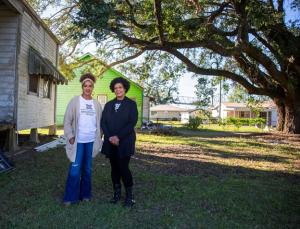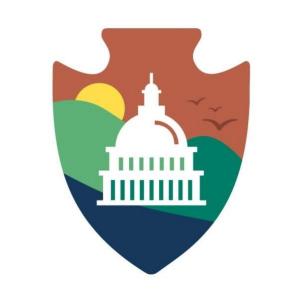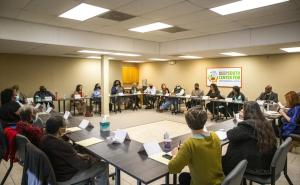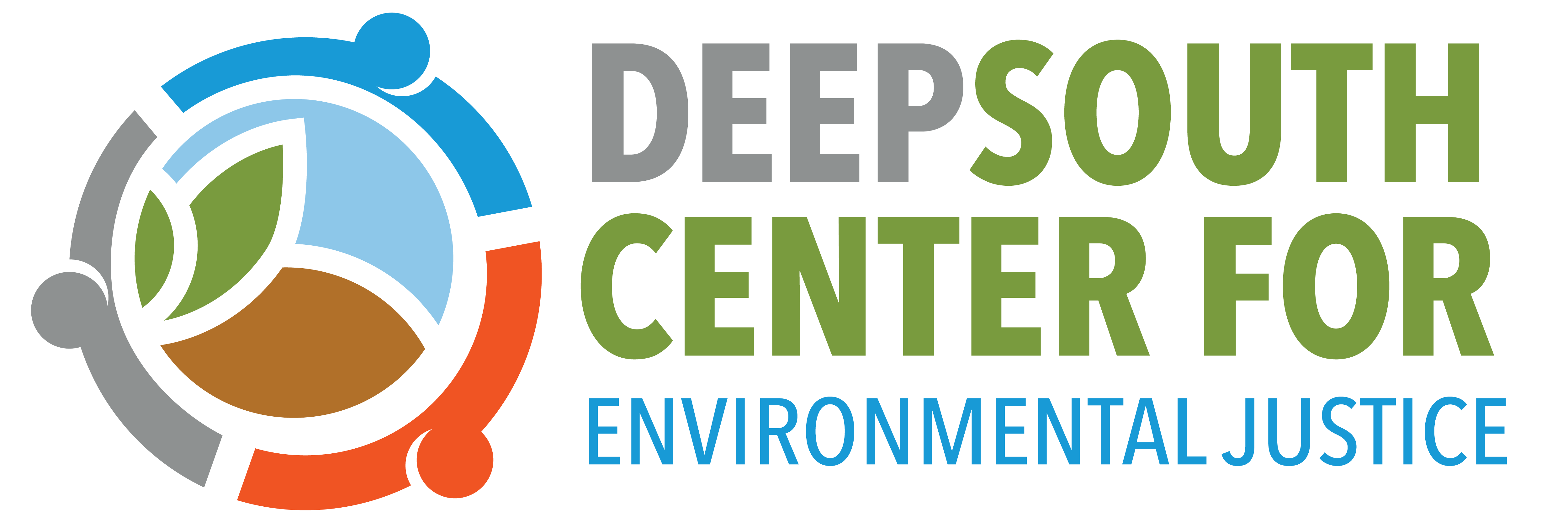
Mar 1, 2022 | The Latest News
The Deep South Center for Environmental Justice (DSCEJ) is now accepting applications for the HBCU Environmental Justice and Climate Corps Internship. Five interns representing five Gulf Coast states will immerse themselves in a hands-on research to action project working with a partner community based organization disproportionately impacted by environmental hazards and climate change.
The five Gulf Coast communities are New Orleans, LA, Houston, TX, Gulfport, MS, Mobile, AL and Pensacola, FL.
DEADLINE: APRIL 23, 2022
For more details and application instructions, please click on the flyer below.


Jan 24, 2022 | The Latest News
By Halle Parker – NOLA.com
Photo by Sophia Germer – NOLA.com
Twins Jo and Joy Banner were just 10 years old when their family was nearly forced to leave their small St. John the Baptist Parish neighborhood to make room for a Taiwanese company trying to build a rayon plant. Originally settled by the descendants of those enslaved on a nearby plantation, the Banners’ cluster of residential homes in Wallace would have been razed and replaced with the corporate offices of that company, Formosa Plastics Group. “They told my parents we had three months to get out,” Jo Banner recalled. “A family of six. In three months, we had to find a home.”
Ultimately, the buyouts weren’t finalized and the project never came to fruition; it was halted after the parish president at that time, Lester Millet, was charged with extortion and other crimes after he schemed to help Formosa build its plant.
Now 43, the Banner sisters have founded a nonprofit that is leading an effort to rid the area of the infamous deal’s lingering legacy and overturn decades-old zoning changes that allow heavy industries to locate next to neighborhoods. “We are the victims of a crime that happened, and here we are, still dealing with this crime,” Jo Banner said. The Descendants Project, the Banners’ Wallace-based nonprofit, sued the parish in November over a 1990 zoning law that rezoned hundreds acres of farmland in Wallace from residential to industrial use. The case is still working its way through the courts; a ruling in the sisters’ favor would effectively block a $400 million grain terminal from being built near the neighborhood.
The group eventually hopes to form working groups of residents who might consider models for collective land ownership, such as community land trusts or land redistribution. Also underway is an effort to map potential burial sites in order to better protect those spaces, said researcher Jordan Brewington, who works with the twins’ nonprofit, the Louisiana Bucket Brigade and other groups.
Though the Banners have become the face of local opposition to Wallace’s zoning rules, their nonprofit actually began with a much different goal. Founded in the fall of 2020, the Descendants Project grew out of the desire to enhance the lives of others descended from the enslaved. The twins also wanted to fix the region’s plantation tourism industry. The sisters argue, for example, that marketing the River Parishes area as “Plantation Country” dismisses slave experiences and takes a narrow view of what makes the area special. The sole Louisiana plantation to make the experiences of those who were enslaved its chief focus is the Whitney Plantation, where the sisters’ great-great-grandmother was born into slavery, and where Joy Banner now works as director of communications, the Banners said. Both women said that tourism jobs are a great alternative to jobs with the petrochemical plants concentrated along the Mississippi River.
“It’s a way of protecting the land. It’s a greener industry,” Joy Banner said. “Our passion for tourism is right alongside the protection of descended communities and preventing environmental racism, or reducing environmental racism as best as we can.” In Louisiana’s chemical corridor, an 85-mile stretch along the Mississippi River between New Orleans and Baton Rouge, industrial facilities are frequently built near Black and low-income neighborhoods, said Deep South Center for Environmental Justice founder Beverly Wright, who was involved in Wallace’s 1990s battle against Formosa. “I don’t know how to explain the constant insult in the expansion of toxic, noxious, dangerous facilities in the same places over and over again,” Wright said. “Once they start, you get zoned for everything that’s dangerous. And then the facilities see it as a welcoming spot because they’ve already got one. They know they can get people to say yes to two, three and four.” Brewington agreed that zoning laws like the ones in Wallace have long harmed vulnerable neighborhoods. “This is centuries of land-based injustice that really began with settler colonialism and the stealing of this land from indigenous folks,” Brewington said. “But we see the continuation of that violence through these zoning decisions, and through the lack of community control over how these lands are stewarded.” Wright said the Descendants Project’s efforts would be a step beyond past attempts by environmental justice advocates to reduce emissions or to have companies pay to relocate residents in polluted communities.
“They’re saying no, we deserve reparations for what has been done to us,” she said. “This land belongs to our families, our families were born, our ancestors who have gone on this land, and we will not be moved.”

Jan 21, 2022 | The Latest News
By Valerie Cleland – NRDC
In a House Natural Resources Committee hearing this week, committee members focused on the connection between offshore drilling in the Gulf of Mexico and U.S. climate goals. This much is clear: continuing ‘business as usual’ offshore oil and gas leasing simply does not put us on a path to meet our climate goals. Every decision our leaders make now needs to consider a clean energy future, not continuing our reliance on fossil fuels. And the administration can and must move towards this future by offering a five-year program with no leasing. As a quick reminder, offshore leasing is regulated under the Department of Interior through the Bureau of Ocean Energy Management (BOEM). Every five years, BOEM is tasked with putting out an offshore leasing program that considers the effect of leasing on the environment and communities. (Read more)

Dec 7, 2021 | The Latest News
May 25th from 6:00 – 7:30 pm CST
This training is both a declarative and procedural learning experience, designed to provide vulnerable communities with the tools necessary to create culturally, responsive trauma-informed systems. The training module seeks to provide participants with the following
-
Increased understanding of a public health pandemic (Coronavirus) and a racial pandemic as a mental health disaster
-
Increased understanding of the impact of COVID19 on emotional well being
-
Increased understanding of trauma-informed systems
-
Increased understanding of ways to integrate trauma-informed practices across the systems with which community members interface
-
Increased understanding of activism and advocacy as a source of healing for vulnerable communities
Trauma-Informed Approaches in Youth-Serving Organizations is a web-based, trauma-informed practice workshop that is part of our larger Professional Development Series. The Series prepares youth development professionals and educators to be equity-focused, trauma-informed, healing justice practitioners. The session on trauma-informed practice covers Adverse Childhood Experiences and its impact on brain development in early childhood. We also address vicarious trauma and the importance of self- care for helping professionals. The session also covers the basic principles of trauma informed systems and the key assumptions of trauma informed practice, as well as strategies for implementing trauma-informed practices in our work. Some of the strategies we cover in the training include social emotional learning activities along with identifying the ways in which writing, the arts, meditation and other practices can be implemented as healing modalities to support the well-being of young people and those who work with them. Register here
Presenters:

Dr. Rashida Govan
Executive Director, New Orleans Youth Alliance
.jpg)
Dr. Danielle Wright
Division Director, Navigate NOLA

Dec 7, 2021 | The Latest News
May 25th from 6:00 – 7:30 pm CST
This training is both a declarative and procedural learning experience, designed to provide vulnerable communities with the tools necessary to create culturally, responsive trauma-informed systems. The training module seeks to provide participants with the following
-
Increased understanding of a public health pandemic (Coronavirus) and a racial pandemic as a mental health disaster
-
Increased understanding of the impact of COVID-19 on emotional well being
-
Increased understanding of trauma-informed systems
-
Increased understanding of ways to integrate trauma-informed practices across the systems with which community members interface
-
Increased understanding of activism and advocacy as a source of healing for vulnerable communities
Trauma-Informed Approaches in Youth-Serving Organizations is a web-based, trauma-informed practice workshop that is part of our larger Professional Development Series. The Series prepares youth development professionals and educators to be equity-focused, trauma-informed, healing justice practitioners. The session on trauma-informed practice covers Adverse Childhood Experiences and its impact on brain development in early childhood. We also address vicarious trauma and the importance of self- care for helping professionals. The session also covers the basic principles of trauma informed systems and the key assumptions of trauma informed practice, as well as strategies for implementing trauma-informed practices in our work. Some of the strategies we cover in the training include social emotional learning activities along with identifying the ways in which writing, the arts, meditation and other practices can be implemented as healing modalities to support the well-being of young people and those who work with them.
Presenters:

Dr. Rashida Govan
Executive Director, New Orleans Youth Alliance
.jpg)
Dr. Danielle Wright
Division Director, Navigate NOLA

Nov 29, 2021 | The Latest News
By Darryl Fears – Washington Post
Beverly Wright, the executive director of the Deep South Center for Environmental Justice in east New Orleans, who also sits on the panel and toured with Regan, said she would give the administration an “I,” for incomplete.
“It could go anywhere from there, an A, a C, D or F,” Wright said. Regan made a strong impression, she said, but “we’ll have to see.”
Wright’s center was the administrator’s first stop in Louisiana. He met with about a dozen community representatives who spoke with him privately before they boarded a small tour bus for the 65-mile ride to St. John the Baptist Parish.
There, in Cancer Alley — which winds for 85 miles along the Mississippi River between New Orleans and Baton Rouge — he stopped at Fifth Ward Elementary School, where hundreds of mostly Black students aged 10 and under attend classes and romp on a playground near the Denka Performance Elastomer plant once owned by DuPont.
The plant emits a hazardous pollutant called chloroprene, which the EPA identifies “a likely human carcinogen” that can cause rapid heartbeats, gastrointestinal disorders, dermatitis, temporary hair loss and corneal damage.
The census tract containing the school has an overall cancer rate that is 25 percent higher than the state average, according to the NAACP Legal Defense Fund, which filed a class-action lawsuit against the St. John the Baptist Parish School Board on behalf of its Black students.
After the EPA determined in 2016 that anything above 0.2 micrograms of chloroprene per cubic meter was dangerous, Denka agreed to reduce emissions by 85 percent despite disagreeing with the finding.
The company succeeded, according to a statement released in March. Denka said it also “developed a voluntary emission reduction program,” coordinated with the state, which was completed in 2017 “at a final cost of over $35 million.”
Concerned Citizens of St. John head Robert Taylor, who sat beside Regan during the tour there, said the exposure of schoolchildren “infuriated and frightened” him. Read more







.jpg)
